The Handheld Is Dead! Long Live The Handheld!
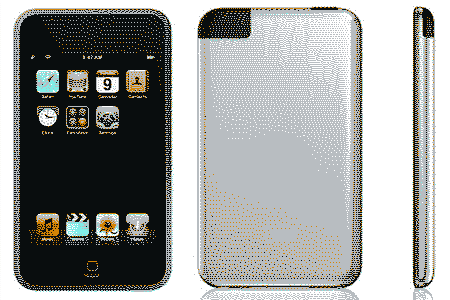
The iPod Touch seems like a good window to intervene. This was part of the charm offensive that rolled out alongside the iPhone, setting up the red carpet for the device that would not only consolidate and set the design of the smartphone, but have reverberating impacts on the aesthetics of personal electronics, the distribution of software, and even, what seemed to be a separate sphere, the web. If you weren't convinced by the vision Steve Jobs had for something as consequential as your phone, why not give it a spin as your music player? What I'm saying is that, yes, I was there. Yes, it did seem exciting and fancy that one thing could just Do So Much Stuff, so much more stuff than the music player you had. Success can seem inevitable, The Product Was Just That Good. But what if it had flopped, and cast a shadow of doubt over the iPhone's entire vision?
There's plenty of people who still prefer the old-style iPods for music playing and storage, and as they've become ubiquitous, the dissatisfactions of what smartphones make annoying or impossible to do necessarily become more prominent than what we like about them. A big part of this annoyance is that they're needed to do so many things nowadays, and these initial "features" are really more like cracks for apps and services to slip in, reduce your ownership and control over your device or the things around you, take up your time, skim some new charges off things that used to be free or have a set price, collect some surveillance data, erode things that were once somebody's actual full time day job, further displace homeless people and poor people and people with disabilities or less understanding of tech gimmicks etc from public life and on and on. Yes! We're sick of them, no one likes them! Unfortunately they are now probably the only relevant portable gaming and/or computing devices.
N█NT█ND█ is sunsetting the 3DS shop for good now and IMO the Switch is not really a portable game system in the way their previous portables were... You can take it with you but the stuff made for it is the stuff made for home consoles, generally. The 3DS was kind of the last standing gaming industry portable that was something people were developing really New software for, now it seems like everyone has gone back to focusing on console or PC releases, OR making something to compete in the bloody and ultimately rather samey arena of the app store. The dream of handheld tech is dead, basically, not by extinction but by stagnation; it's everywhere but we've decided on pretty much the entire horizon, which is putting together the few touch screen mechanics that have already worked in new ways we might be able to extract further microtransactions and/or subscription fees from.
Sidenote: And I find the kind of boutiquey indie handheld projects to be kind of retrograde, by which I mean retreating back into this history rather than building on it or taking it in a new direction. They tend to be either customizable and mainly for emulation, or, alternately, basically a Game Boy but more sleek, tiny, fiddly, closed. They have their place but that place is not really in the imagination.
SO what do I want handheld tech to be? How do I want it to come back to life if the onyx-screened buttonless smartphone dynasty does eventually fall? As a creation of man it must fall away, that's obvious, but what could replace it is less so.
My skin in the game

I have a smartphone that, like an elegant and well-off divorcee to her favorite ex-husband, I feel like I have a "managed" relationship with. When I look at it I realize all of the personal negotiations that have gone into it, often cutting against the grain of what a smartphone tends to "want" you to do. It is a rose gold iPhone SE, so more similar to the iPod Touch in look and feel than current iPhones, which have gotten huge, too heavy and wide for my little baby hands to use (the presumption of certain types of bodies and forms of dexterity is another issue with the almost complete uniformity of design smartphones have undergone). With a few aesthetic changes and added features, the iOS also mostly works the same way, apps are squares you access from the home screen where you can move them around, sort them into subfolders that act like little drawers, etc... when people ask me my secret for still being able to use it after so long my answers are A) I have removed or greatly reduced most of the things it does by default (notifications, sending things to "the cloud," any apps beyond the most basic social media platforms I use and games I play), B) including automatic iOS updates, which I have not allowed to run since approximately July 2017.
The reason for this is not arbitrary, it is the last iOS update that Flappy Bird is still functional on. Flappy Bird feels like a consummate masterpiece of handheld game design for the smartphone paradigm, I didn't want them to take it away from me. But also I knew in the past that the more I updated, the more I tried out fancy new apps, and so on, the more permissions were requested of me, the faster my battery drained, the more types of ads I was served, the faster things I liked were obsoleted, and the less my device felt like mine. I didn't like it so I stopped.
This means I can't download and run many newer apps, obversely it also means that my battery life is still basically fine for the foreseeable future, the features I need still work fine, and I don't feel the need to chuck it and buy a new one for as long as this continues. It's not the ideal level of agency and ownership I'd have over a device, but it's still an example of how sometimes not playing along at all can be the most effective way to scratch back a bit of control.
Expressiveness and Autonomy

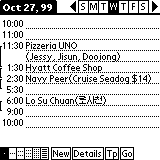

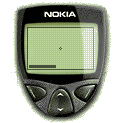

The Windows 95 PC was the crown jewel of my childhood enchantments but the gadgets were all close seconds. The first gadgets were things like instant cameras, sticker machines, craft kits, miniatures, that let me feel like I could record the things that mattered to me, decorate my space, and have space to imagine new things. I think this is what all my favorite hand-held items essentially have done since. There were a variety of virtual pets, albeit stressful, that let me create a sort of mental narrative and be moved by fairly arbitrary occurrences on a tiny screen. Portable music players unlocked a new level of imaginative contemplation as well as identity formation via music sharing. There were the pocket dictionaries and graphing calculators with intriguing extra features, watches with LCD screens, my first cell phone, and then my first cell phone with a camera and keyboard that slid out. And of course, the actual handheld game consoles, which often smuggled in other features beyond games.
The coolest thing I had was probably a palm pilot like device marketed to teen girls called a VTech Phusion. It had a very rudimentary camera that could be swivelled around to face in and out. Most of the time anything it'd produce would be completely incomprehensible (but you could put stickers on it). You could take notes, presumably email them to people (though I didn't know anyone with an email address then, I think), it had some games including a friendship tester and fortune generator as well as some surprisingly in depth features like budgeting software and the ability to make a database on any topic. I probably got it at the wrong time in life, because I was too young to need to know how to budget, or send emails, or what the point of a portable database would be. Maybe it was a bit too adult to market to kids, but it still excited me to think of being able to use all these features, to know they were there. And playing with the photo editor, writing down notes, trying to figure out the rhyme or reason behind the fortunes it would spit out, and so on, these also let me explore something and make it my own.
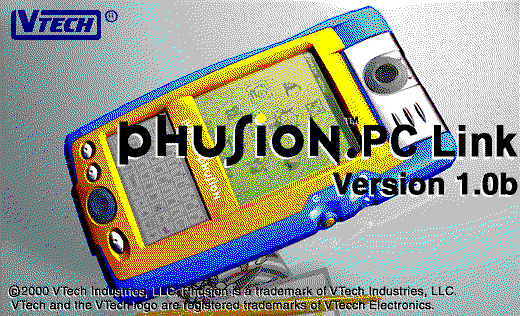
I wonder what I wrote on it, the same as the writing entombed in the floppy discs I stuck in our first family PC, or the whole novel drafts sitting on dead high school laptops somewhere. If there is one constant in my life it is that I have always produced a basically unstoppable amount of writing, and, if you take one look at my handwriting, you know computers are the thing carrying me through all of this. Maybe that's why I've always felt so close to something I can type into. I feel negative to ambivalent about practically everything else about iOS but I still love the Notes app.
Many of the ways of transferring data felt so free and light at the time, they were almost magic, such a contrast to the glop of Amazon buckets and centralized social media platforms and tracking data and cloud services and on and on that feels like it makes communication and collaboration drudgery now. I mean, look at this watch that can receive optical data! Remember Street Pass? Remember sticking two things together with a COM cable? Remember when you had to text Twitter? There's all these points of freedom and connection and possibility we can revisit, to have a expressive and autonomous relationship to our technology again, well, if only the physical instantiation of these digital devices had been as flexible.
Waste
Of course, a lot of the single-use gadgets and early pocket computers and portable consoles that I miss, while they were more creative, more open, less intrusive, etc, to varying degrees, none of them were really meant to have long lives, they're all in landfills now, probably. Beyond the environmental and economic impact of these failures, this is just, in general, disappointing! I'm tired of loving and letting go, enough Goodbye Stranger; what is a piece of technology I can really live with?
Something I remember people saying about the generation of iPhone I've been happily using for the last 6 years or so is that it was "like jewellery" in its look and feel. I think the next generation went back to the mirrored silver look and/or plastic but I think this is interesting and worth noting. Who spends like, upwards of 3 figures on a piece of jewellery expecting to throw it away within 5 years? Maybe we should think of these things like a wedding band or keepsake necklace. I mean, I don't buy or wear a ton of jewellery but the presumption is, I think, if you spend a good chunk on it, it'll either be an important gift to someone or become a part of your wardrobe, your aesthetic, your routine for the long term. I love the things I own that are like that, the good coat, the good hat, the good boots, the good bag, the good mug, the ring I always keep on my middle finger, a favorite paperback that gets softer and nicer to reread with age... and that was always the fantasy I had about the varied palm pilots game consoles cell phones music players etc of my childhood, that they would be really integrated into my life and routine, and in a pleasant sort of way, where they rise to meet my needs or reveal some new use or lovely feature of themselves to me all the time.
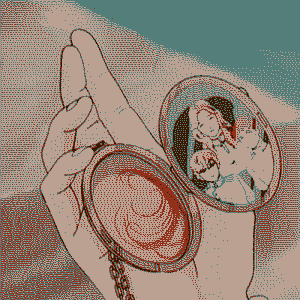
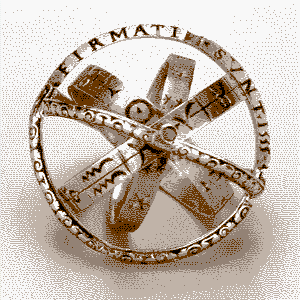
The thing is, a lot of these early hand held tech things did kind of sell themselves in this way: it would solve X Y or Z problem definitively! It would change your life! While this was a claim that usually utterly failed, it now seems like no one is interested in even trying to make this claim facetiously. There's the presumption that you will abandon ship and forget as soon as the next console generation is available, and every 3-5 years eat the costs of a new laptop or phone after some catastrophic malfunction no one can pry apart the pieces to fix severely inconveniences you. And there's no interest in changing this, because it's how money changes hands the fastest, offering excellence in few other qualities.
A Hand-held Sensibility

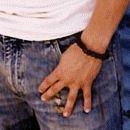

What's fun? What do I want technology to do? How does it fit in my own life in a way that is comfortable, exciting, interesting, flexible, etc and also reduces the e-waste and heavy reliance on exploitative supply chains and manufacturing that is the precondition for smartphones being able to become the ubiquitous piece of portable tech in the first place?
Another gadget that has lasted me and my partner a surprisingly long time is a 3rd generation Kindle. These are the ones that have a simple e-ink screen and keyboard, and also have a free 3G connection. While Amazon is an unambiguously evil corporation, these devices are weirdly utopian; the free internet connection and smooth, well-featured reading experience they offer for whatever public domain or pirated ebooks you can load onto them really makes it feel like a device that wants to connect you to knowledge, let you find it and make bookmarks in it and take notes. In the landscape of consumer grade technologies it really has no right working this well and lasting this long. And yet it does; surely, given the direction Amazon has taken its e-reader line in now, it was an accident. But it's possible, you know.
I dream of a chunky little handheld computer, not small enough to follow you everywhere in your pocket, but worth taking with you everywhere in the way that a really good paperback book you're in the middle of reading is. The screen is e-ink so it's easier on my eyes, the batteries last longer, and I can take it outside on a sunny day (and if it can have a solar charger, all the better). I can take it apart to clean it, fix it, plug things in to it and make it do new things. But mainly what I want it to do is give me a good place to write, send emails, keep a simple planner, browse a simple web, and play simple games, mostly made by my friends. It's similar to something Freya imagined, but in this world with just a few changes in the parts she could make it exactly how she wants too.
I dream about these things being good, I dream about these things being fun and liberating still because I remember the intimacy and excitement and possibilities of playing with your tamogotchi, holding your Game Boy color right up against your face on a car ride, the first crude and pixelly digital photo you took of yourself or something you loved, the first contact made and returned on a device you were just learning how to use, sinking into the familiarity of a comfortable, fiddly, relaxing way of killing time (Snake on my Nokia brickphone), noticing something on a parents' dresser, you still use THAT?, how tantalizingly easy it is to get books off IRC, on and on and on... I don't have an un-techy childhood, a de-gadgeted past, to look back on; how am I meant to long for one?
I don't want those experiences to be turned into simple nostalgia and commoditized and exploited, but I don't want to have to erase them either, I don't want that pleasure and possibility to be extinguished. Technology intimately close is scary now, because of how consolidated, commercialized, and deliberately cruel our current tech infrastructure is, because of how it's made, for whom, and who owns the whole thing. But I don't think this desire for intimacy with technology is any more unnatural or misguided than our desire for intimacy with other people, with our immediate experience of the world, with how we move about the places where we live, do work, eat food, etc, and intimacy and comfort with the furnishings of our own home. To be hand-held, there is something about that connects to the human relationship to tools and technology, as well as how we keep our desires close and take them with us. All the more horrible that they're now all the same. I think we've got to change it.
